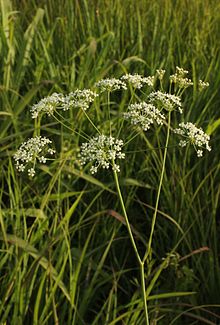| Perideridia americana | |
|---|---|

| |
| Perideridia americana photographed in Missouri tallgrass prairie. | |
| Conservation status | |
 Apparently Secure (NatureServe) | |
| Scientific classification | |
| Kingdom: | Plantae |
| Clade: | Tracheophytes |
| Clade: | Angiosperms |
| Clade: | Eudicots |
| Clade: | Asterids |
| Order: | Apiales |
| Family: | Apiaceae |
| Genus: | Perideridia |
| Species: | P. americana |
| Binomial name | |
| Perideridia americana (Nutt. ex DC.) Rchb. | |
Perideridia americana is a species of flowering plant in the family Apiaceae known by the common names eastern yampah and wild dill. It has been found in 12 Midwestern United States, and is listed as threatened or endangered in at least 3 of them. In Missouri it is a conservation species of concern.
Wild dill grows in calcareous soils in many habitat types, including glades, upland prairies, and forests. It is a perennial herb whose upright stems are between 50 and 120 cm (20 and 47 in) tall, with sparse alternate doubly pinnate leaves ending in long tapering leaflets. The inflorescence is a compound umbel of many spherical clusters of small white flowers. The fruits are 3–5 mm (1⁄8–3⁄16 in) long with 5 slender ribs. After fruiting, it goes dormant until the next spring. Its root system has tubers, usually two per plant, 5–10 cm (2–4 in) underground.
The life cycle of this species was described in a 1993 paper.
References
- "Perideridia americana at USDA". Retrieved August 16, 2016.
- "Missouri Plant Species of Conservation Concern" (PDF). January 2016. Retrieved August 16, 2016.
- Yatskievych, George (June 2006). Steyermark's Flora of Missouri. St. Louis, Missouri: The Missouri Botanical Garden Press. ISBN 1-930723-49-0.
- Thayer, Samuel (2023). Field Guide to Edible Wild Plants of Eastern and Central North America. pp. 464–465.
- Baskin, Jerry M.; Baskin, Carol C. (1993). "The Ecological Life Cycle of Perideridia americana (Apiaciae)". American Midland Naturalist. 129 (1): 75–86. doi:10.2307/2426437. JSTOR 2426437.
External links
| Taxon identifiers | |
|---|---|
| Perideridia americana |
|
This Apiaceae article is a stub. You can help Misplaced Pages by expanding it. |